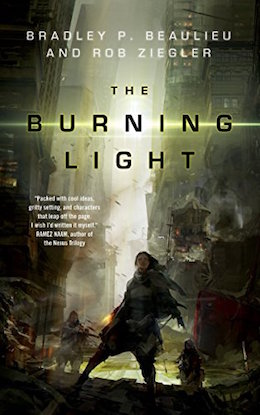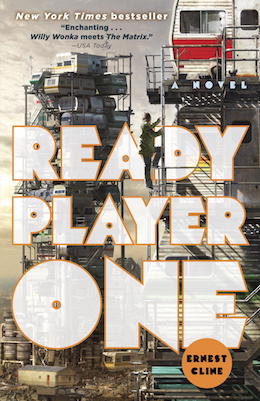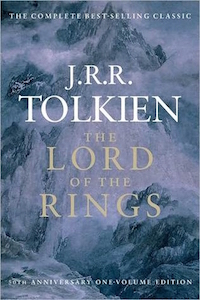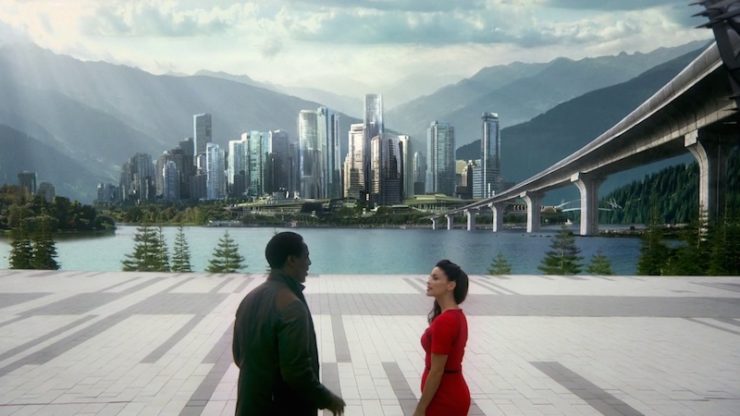The multitude of stresses that come from merely existing in the world are manifold, and the ability to step back from reality can be an enticing prospect when we’re overwhelmed by the state of things. While we have our share of coping mechanisms in the here and now—vacation, entertainment, drugs, meditation—fiction often provides us with scenarios in which the chance to “get out” of the current paradigm becomes a very literal prospect.
But the act of opting out is never a painless one. Here are several tales where the ability to divorce from the world as you know it has consequences that you never could have predicted.
The 100
When your planet is still suffering the effects of nuclear war a century later and its survivors are blowing each other up, it seems impossible to hope that there’s a mythical City of Light in the distance, right across the Dead Zone, with electricity and other amenities from the time before. Discovering that that shimmering city on the horizon are the worst kind of mirage—a field of reflective solar panels—makes it all seem even more hopeless… which is exactly when the real City of Light reveals itself, because only at your lowest can you discover the key to unlock its gates.
The City of Light is in the minds of everyone who believes in it (and takes the handy “key” provided by the malevolent artificial intelligence A.L.I.E.); it expands as more people join, filling the streets and buildings with their happiness. The problem is, that happiness occurs only with the absence of pain, as the key blocks pain receptors and erases any memories that would cause mental anguish. All you have to do is follow A.L.I.E.’s plan for her little digital dollhouse. Because if you decide you want to move away from the City of Light, suddenly all that pain will come rushing back tenfold. This is the AI that launched the nukes—she means business.
But it’s not as black-and-white as that, as we discover at the end of The 100 season 3: Abandoned nuclear power plants the world over are slowly releasing radiation, and the Earth will become uninhabitable within six months—making the City of Light the only escape for humankind. At least, according to A.L.I.E. —Natalie Zutter
“The Ones Who Walk Away From Omelas” collected in The Wind’s Twelve Quarters by Ursula K. Le Guin

Ursula K. Le Guin’s famous short story turns on a simple but devastating premise—that the people of Omelas are permitted true happiness and fulfillment at the expense of one child, left in squalor and darkness, who is given no human contact. The tale is something of a philosophical exercise, where Le Guin asks the reader to entertain the concept of meaningful happiness, as pain and evil seem to be the default up for examination in fiction. Instead, Le Guin asks us to consider how much more credible happiness seems if we are aware of its true cost, in this case, the cost of a child’s misery and neglect.
And then we are left with another possibility: that there are those who see child’s plight and refuse to participate in their society any longer. They walk away from Omelas and never return. The rejection of their reality leads them to “a place even less imaginable to most of us than a city of happiness.” Because they cannot alter their reality—none of the denizens of Omelas are willing to save this child at the expense of everyone else’s utopian existence—they are forced to leave it behind. —Emmet Asher-Perrin
The Burning Light by Bradley P. Beaulieu and Rob Ziegler
 Unlike other entries on this list, it isn’t clear if the future as envisioned by Beaulieu and Ziegler is more utopian or dystopian: On the one hand, major metropolises like New York City have been flooded, with gangsters-turned-cops patrolling the canals that wind around former skyscrapers stripped and gutted. On the other hand, everyone is connected by a neural network, on both a local and global scale: One of the two protagonists, Zola, remembers a time when she piloted thousands of ships with her mind, comforted and held close by the white noise of Latitude, her hive-mind home.
Unlike other entries on this list, it isn’t clear if the future as envisioned by Beaulieu and Ziegler is more utopian or dystopian: On the one hand, major metropolises like New York City have been flooded, with gangsters-turned-cops patrolling the canals that wind around former skyscrapers stripped and gutted. On the other hand, everyone is connected by a neural network, on both a local and global scale: One of the two protagonists, Zola, remembers a time when she piloted thousands of ships with her mind, comforted and held close by the white noise of Latitude, her hive-mind home.
Actually, even that leans toward the dystopian. So it’s not so surprising that Zola as we meet her is a junkie, hollowed out from her forays into the Light so that she can’t share thoughts with anyone but her fellow ruined people. Cult-like in its fervency yet purer and more cleansing than anything else, the Light is both a refuge and a trap. Those who let it enter them, who become haloes to send the Light out to everyone around them, both regret ever discovering it and can’t imagine living without knowledge of its existence and its baffling but compelling message: I AM. I AM. I KNOW YOU. YOU ARE. —Natalie Zutter
Uglies by Scott Westerfeld
 In the world of Westerfeld’s Uglies, teens are turned into “Pretties” on their 16th birthdays—a form of cosmetic surgery that renders them happy and stunning. Pretties live in cities with no cares, no worries, no responsibilities. It’s a life of fun and parties, all the time—a life built on the ruins of the former world, which fell apart when oil became unstable. Our heroine, Tally, can’t imagine why anyone wouldn’t be excited about becoming a Pretty. But like so many seeming escapes from the mess and trouble of the real world, the operation is not what it seems. It’s also not really optional: When Tally’s best friend disappears before the operation, Tally is tasked with hunting her down and bringing her back to be prettified.
In the world of Westerfeld’s Uglies, teens are turned into “Pretties” on their 16th birthdays—a form of cosmetic surgery that renders them happy and stunning. Pretties live in cities with no cares, no worries, no responsibilities. It’s a life of fun and parties, all the time—a life built on the ruins of the former world, which fell apart when oil became unstable. Our heroine, Tally, can’t imagine why anyone wouldn’t be excited about becoming a Pretty. But like so many seeming escapes from the mess and trouble of the real world, the operation is not what it seems. It’s also not really optional: When Tally’s best friend disappears before the operation, Tally is tasked with hunting her down and bringing her back to be prettified.
Blissful ignorance isn’t a choice; it’s a requirement. Like The 100’s City of Light, Prettyhood presents itself as a blissful way out of a tough existence; just trade in your selfhood, and happiness is yours! Here, though, the faux-utopia is the norm. The opting-out is done by those who reject it: “Smokies,” who live outside the cities, trying to create a haven that welcomes the individual and rejects the Pretty existence. There’s no middle ground: Do you opt out of a broken reality by mentally becoming oblivious to it, or opt out of a controlled existence by physically going out into the world and facing it as it is? How do you grow up when you either reject yourself or reject your world? —Molly Templeton
Ready Player One by Ernest Cline
 It’s ironic that the OASIS is less futuristic than the time in which it exists: While this MMORPG is certainly advanced technology, Ernest Cline’s vision of 2044 is so bleak—with the majority of people living in slums made up of skyscraper-tall stacks of mobile homes and shacks—that its inhabitants retreat into a digital world. Moreover, they escape into the past: Each of the OASIS’ planets recreate a beloved movie, TV series, or book from decades gone by, including Middle-earth, Firefly’s ‘verse, and every ‘80s movie and/or property imaginable. By burying themselves in their imagination or their memories of more idealized eras, they can ignore the energy crisis, global warming, and economic stagnation reshaping the planet.
It’s ironic that the OASIS is less futuristic than the time in which it exists: While this MMORPG is certainly advanced technology, Ernest Cline’s vision of 2044 is so bleak—with the majority of people living in slums made up of skyscraper-tall stacks of mobile homes and shacks—that its inhabitants retreat into a digital world. Moreover, they escape into the past: Each of the OASIS’ planets recreate a beloved movie, TV series, or book from decades gone by, including Middle-earth, Firefly’s ‘verse, and every ‘80s movie and/or property imaginable. By burying themselves in their imagination or their memories of more idealized eras, they can ignore the energy crisis, global warming, and economic stagnation reshaping the planet.
With society at risk of literally crashing down around them at any point, OASIS users conduct almost every aspect of their professional and personal lives in the digital space: attending school, working, partying—and gunting. Just because the OASIS is an escape doesn’t mean its inhabitants wander around without a sense of purpose: A huge percentage of the population have become egg hunters, or gunters, searching for the Easter egg that contains the founder James Halliday’s billion-dollar fortune and total control over the OASIS itself. —Natalie Zutter
The Lord of the Rings by J.R.R. Tolkien
 By the time that the denizens of Middle-earth learn that Sauron’s One Ring is once again a threat to all free peoples, the elves have already basically forfeited the game. Sure, there are a few hanging around because they want to help—Elrond does what he can, Galadriel offers the Fellowship a nice slew of supplies after scaring the ever-loving crap out of the Ring bearer for funsies—but a lot of them are fleeing the world because the time of Men is supposed to be at hand.
By the time that the denizens of Middle-earth learn that Sauron’s One Ring is once again a threat to all free peoples, the elves have already basically forfeited the game. Sure, there are a few hanging around because they want to help—Elrond does what he can, Galadriel offers the Fellowship a nice slew of supplies after scaring the ever-loving crap out of the Ring bearer for funsies—but a lot of them are fleeing the world because the time of Men is supposed to be at hand.
Of course, the time of Men can only come to pass if they get some help against Mordor. Otherwise it’ll be the time of Super Evil Eye. But the Elves don’t care so much because they hear the call of the sea. Legolas complains about that a couple times on their journey, talking about the gulls and wanting to check out. But the thing about their final destination (that’s Valinor, btw) is that you can’t come back once you’ve crossed the sea. Because it’s kind of their version of heaven? So. In this case, checking out of their current reality is kind of a literal undertaking. —Emmet Asher-Perrin
Honorable Mentions: In Divergent‘s post-apocalyptic future, people are forcibly opted out of their reality if they are deemed casteless. And running opposite to this theme, Jon Scalzi’s Lock In features the Agora—a virtual space that allows people with Haden’s Syndrome to essentially opt back in to their reality by giving them a means to interact.











There’s Finity, by John Barnes. I didn’t love this book like I love most of his books. It’s not bad, but he’s done better.
I liked Invitation to the Game (https://g.co/kgs/DKYPVH) Where people started out avoiding reality only to have to face their online fantasy as a new real life reality. I read it as a youngster so I may have missed some of the political stuff.
Kinda resent the snarky tone re: LOTR.
All through the Culture books, entities and entire civilisations “sublime” and move on to a different order of existance.